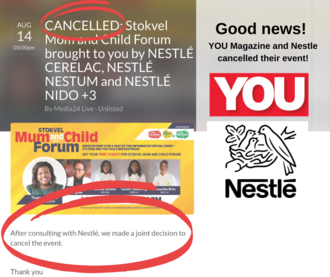- Featured
- Clean air
- Climate justice
- Consumer Rights
- Corporate Accountability
- Data access
- Early Childhood Development
- Economic fairness
- Education
- Electoral fairness
- Environmental justice
- Food justice
- Gender based violence
- Grants/social assistance
- Health
- Housing and infrastructure
- Industry interference
- Land Justice
- LGBTQIA+ rights
- Media/ information access
- Public transport
- Racism
- Reparations
- Safety
- Sanitation
- Service Delivery
- Sexual and Reproductive Rights
- Social justice
- Unemployment
- Womxn's rights/ gender equality
- Workers' rights
- More
-
LIMIT ONLINE GAMBLING TO PROTECT OUR COMMUNITIESGambling addiction is a growing concern, causing: - Financial ruin: Gambling addiction can lead to bankruptcy, debt, and financial instability, affecting not only individuals but also their families and communities. - Family breakdowns: Problem gambling can strain relationships, lead to divorce, and cause emotional distress for loved ones. - Mental health issues: Gambling addiction is linked to anxiety, depression, and even suicidal thoughts. Public servants, in particular, have a responsibility to: - Manage public resources effectively, which can be compromised by gambling addiction. - Make decisions in the best interest of the community, unbiased by personal financial struggles. Allowing individuals to gamble with their entire salaries online can lead to: - Exploitation: Unscrupulous gambling operators can take advantage of vulnerable individuals, perpetuating financial hardship. - Financial hardship: Gambling away entire salaries can lead to poverty, homelessness, and reliance on public assistance. - Perpetuating cycles of poverty: Gambling addiction can trap individuals in a cycle of debt and financial struggle, making it difficult to escape. By implementing regulations on online gambling, we can: - Protect individuals and families from financial ruin and emotional distress. - Ensure public servants maintain the integrity of their office and make decisions in the best interest of the community. - Prevent exploitation and financial hardship, promoting financial stability and responsible gaming practices. The Urgency of the matter: The need for regulation on online gambling is urgent due to the rapid growth of the industry and the increasing number of individuals affected by problem gambling. The ease of access to online gambling platforms, combined with the anonymity and isolation of online interactions, has created a perfect storm for addiction. Why Now: The time to act is now because: - Online gambling is becoming increasingly popular, especially among young people. - The COVID-19 pandemic has accelerated the shift to online gambling, leading to a surge in problem gambling cases. - Existing regulations are inadequate, failing to address the unique risks associated with online gambling. Risk: If nothing is done: - Problem gambling rates will continue to rise, leading to more financial ruin, family breakdowns, and mental health issues. - Public servants will remain vulnerable to exploitation, compromising their integrity and decision-making. - Communities will suffer from the economic and social consequences of unregulated online gambling. Personal Story: As someone who has seen the devastating effects of gambling firsthand, I understand the importance of urgent action. "My own struggles with addiction have taught me the importance of responsible gaming practices and the need for support. I believe that by sharing my story, I can help raise awareness and advocate for change". Mndntv delves into the harrowing stories of those who’ve hit rock bottom and seeks expert insights from a psychologist and the National Gambling Board on the urgent need for tighter controls to protect vulnerable lives. Watch the documentary here:https://www.youtube.com/watch?v=3hHJVwapt3A447 of 500 SignaturesCreated by Sisanda Lwana

-
Stop closed door meetings between government and big businesshttps://youtu.be/nuVHJT_rhgI Imagine your teacher smoking in the classroom. For some of us, this was the reality until new rules were put in place by government in 1993 [6]. But why had government not acted sooner? In their paper published in 2003, Mia Malan and Rosemary Leaver outline the relationship between the biggest tobacco business and government [7] [8]. Government eventually put public health before profits, thanks to the work of health advocates. But big businesses are still using their power to protect their profits at our expense. Researchers have pointed out that big businesses have worked to delay and delegitimize important health policies by using their associations and different strategies [9]. Researchers and civil society groups are not allowed to attend a standing meeting between the National Department of Health and big food businesses [9]. State capture has shown us we have a lot of work to do. But we are making some progress in improving transparency and accountability. Politicians have to declare financial interests [10], and political parties now must disclose who funds them [11]. We need to keep building on this momentum. We can't afford to have a repeat of 2014 where big businesses that make food like polony did not agree with government's proposed hygiene rules and instead wanted to self-regulate [12] [13]. Government should have stood up to those big businesses in 2014 and put the new rules in place anyway. Government has to stand up to big business bullies. Their job is to serve the people, not private interests. References can be found here: https://amandla.mobi/big-business-bullies-references8,399 of 9,000 SignaturesCreated by amandla mobi member

-
Minister Motshekga, keep South African schools as alcohol-free zones!!This is an issue that affects everyone in our society - learners, educators, school admin staff, and anyone who has, or will have, a child in the school system. There is a saying that 'it takes a village to raise a child'. Well, it takes a caring society to protect its children from exposure to the risk of harm. Alcohol use is already a major problem in our country. Schools in some communities already face the challenge of having large numbers of liquor outlets around them and very close to them. Some already have problems with alcohol being used on their premises. Making it possible for schools to have liquor for the purpose of fund-raising simply increases the risks for all of those at schools - learners, educators, admin staff, and even family members who interact with the school. If schools have a problem raising funds, government and society must work with them to address it in other ways - allowing schools to raise money through liquor is not the answer. We should be better than that as a society, as South Africans. We call on you to join us in urging the government to scrap the sections in the BELA Bill which will allow liquor on school premises and at school events. Support the call for a complete ban on liquor on school premises (except for personal use by staff who live on school property). Demand better funding models for our schools so that all children have access to quality education in a safe and protected environment. Fly a blue ribbon at your school in support of the campaign; wear blue ribbons as a group as you participate in school activities. Write to the Minister at [email protected] to tell her what you think of the alcohol clauses in the BELA Bill. Write to the Portfolio Committee in Parliament by 15 June to register your opposition to the alcohol clauses in the Bill - Mr Llewellyn Brown, the Committee Secretary via email: [email protected] or online at https://forms.gle/MoC6AdbdQyYPk3Y49 or via WhatsApp: +27 60 550 9848. Mr Llewellyn Brown can be reached on 083 709 8450 for enquiries. Download the BELA Bill from https://www.parliament.gov.za/storage/app/media/Bills/2022/B2_2022_Basic_Education_Laws_Amendment_Bill/B2_2022_Basic_Education_Laws_Amendment_Bill.pdf Together we can win this one!6,192 of 7,000 SignaturesCreated by Southern African Alcohol Policy Alliance in SA (SAAPA SA)

-
Victory: YOU Magazine must cancel their Nestle event. Put child nutrition first.The majority of mothers and guardians in Mzansi are unable to afford nutritious food for their babies and children, let alone put food on the table [1]. On top of this, mothers and guardians are constantly bombarded by marketing by food companies to sell their ultra-processed products which are packed full of sugar. Food companies like Nestle have undermined breastfeeding promotion in the past, so the Department of Health put in place regulations to limit how companies advertise and promote their products. These regulations were put in place to help protect mothers, guardians, babies and children from these companies. But Nestle’s latest marketing campaign violates these regulations meant to safeguard the nutrition and health of Mzansi’s children, at a time when three million children have been affected by hunger in recent months [2]. This is unacceptable. If we are going to start changing this situation, we must challenge companies who put their profits before people's health. [1] Household affordability index, Pietermaritzburg Economic Justice & Dignity Group, 28 July 2021 [2] Food crisis: 2.5 million South Africans experience hunger ‘every day’, By Nic Spaull and Mark Tomlinson for Daily Maverick, 26 May 2021312 of 400 SignaturesCreated by amandla .mobi member

.png)
.jpg)


